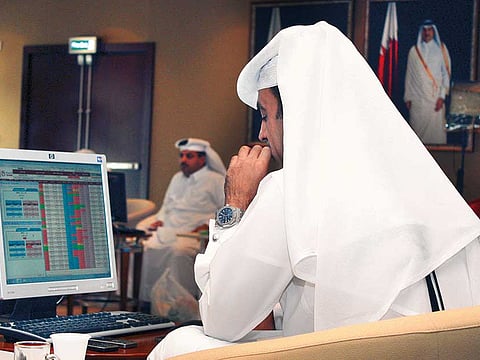Mideast funds less negative on Qatar, turn bearish on Egypt
Many won’t add to Qatar holdings before crisis resolved

DUBAI
Middle East fund managers have become slightly less bearish towards Qatar’s stock market despite the diplomatic crisis surrounding that country, while they have turned negative on balance on Egyptian equities, a monthly Reuters poll showed.
Thirty-eight per cent of managers expect to reduce their allocations to Qatari stocks over the next three months while 8 per cent anticipate raising allocations, the poll of 13 leading regional funds found. It was conducted over the past week.
In last month’s poll — which was conducted before Saudi Arabia and three other Arab nations cut diplomatic and trade links with Doha on June 5, accusing it of supporting terrorism — 54 per cent expected to cut Qatari allocations and none to raise them. Many managers had been bearish on Qatar even before the diplomatic crisis erupted because equity valuations were higher than in most of the region, and in emerging markets around the world.
“The market was trading at a relatively demanding valuation ... We were underweight Qatar before some of its Gulf Cooperation Council neighbours and Egypt severed ties with it,” said one manager, who declined to be named because of political sensitivities.
The Qatar stock index’s 9 per cent plunge in response to the crisis has in one way made Doha more attractive, by making valuations more reasonable. The index is now at a 12-month forward price-to-earnings ratio of about 13 times, against 15 times for Saudi Arabia — though it is still well above Dubai’s 9.5 times.
Many fund managers say they will not buy Qatari stocks until there is more clarity on how the crisis will be resolved, and in particular, on whether the Saudi and UAE governments will tighten sanctions by, for example, prohibiting their companies from owning Qatari assets.
But many think Qatar’s huge external reserves and status as the world’s top liquefied natural gas exporter mean its economy will not be crippled by the current sanctions in place. So if the dispute is eventually settled, some Qatari stocks could look very attractive.
The biggest change from last month’s poll is that funds have turned negative towards Egyptian shares for the first time since February.
Thirty-one per cent said they planned to reduce their allocations to Egypt and only 23 per cent to raise them; last month, the balance was 8 per cent (reduce) and 46 per cent (raise).
Cairo’s index of blue chips hit an all-time high in June but that left prices looking “toppy”, one fund manager said, adding that a pullback could not be ruled out until there was a fresh stimulus for the market.
The latest poll showed funds remained positive towards Saudi Arabia, with 46 per cent saying they planned to raise their allocations and none to cut them, unchanged from the previous month’s results.
On June 20, index compiler MSCI said it would add Riyadh to a watch list for possible upgrade to emerging market status, though the actual upgrade — if its decision is positive — would only occur in 2019.
“The Saudi market benefited hugely from being put on the MSCI Emerging Markets watch list for 2018. We expect that trend to continue in the summer,” said Mohammad Ali Yasin, chief executive of NBAD Securities in Abu Dhabi.
The Saudi stock index is up 6.8 per cent since June 20.



